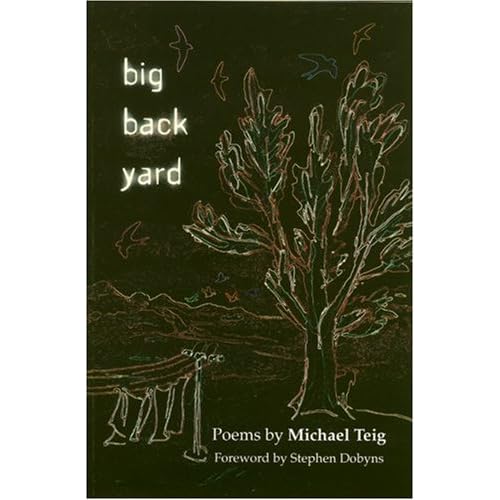
I just returned from Mary Jo Firth Gillett's reading/book launch party at the Scarab Club in Detroit for her first book
Soluble Fish, for which she was awarded The Crab Orchard Series in Poetry's First Book Award. I am excited to finally have this book in my eager hands. I've known Mary Jo for years through her workshops for
Springfed Arts-Metro Detroit Writers and she has become a mentor and friend. I am a big fan of her work and very excited for her. Based solely on the poems she read from the book, I urge you to pick up a copy of
Soluble Fish.
Here's a poem from the book. One of my favorite Mary Jo poems:
Chicken TileBy Mary Jo Firth Gillett
The first time I saw my mother cry I was five or maybe six and being
careful not to step on the square tile in the middle of the kitchen floor.
It held the shape of a rooster with bright cockscomb and open red beak
that seemed to jump out at me. I tried not to look at it or at my mother
standing over the sink, her back to me, her narrow shoulders quivering
like the neighbor’s collie who’d slunk home that night whining, his leather
leash dragging; and on Dixie Highway, the thin body of my eleven-year-old
neighbor sprawled flat in the rain in her cotton print dress. It was then
I knew that terrible things happen – for every thousand birds seen
swooping in perfect parabola, one is snagged by some sudden momentum,
some momentary lapse of impulse or instinct. And, walking home
on a bone-cold day in a white cocoon of snow, I was eight and hadn’t thought
of my dead neighbor in months. Crossing Shea Avenue wrapped like
a mummy in my scarf, I heard the crunch of something heavy
rolling toward me. I jumped and the car fin barely caught my shoulder
spinning me around unhurt, but small and twirling and rigid as a little
ballerina in a jewelry box. Home again, I pulled off my heavy clothes
and the wet wool stink rose around me and the chicken’s shiny black eye
stared; and I stared back hard at that stupid, gaudy bird placed so improbably,
so immovably in the square tile, flat in the middle of our kitchen floor.
(From
Soluble Fish, 2007 Southern Illinois University Press)
Another fellow poet, Sophia Rivkin, read prior to Mary Jo. Sophia is also a wonderful poet and it was so great to hear her work again (I was in one of Mary Jo's workshops with her several years ago but have not had the pleasure of working with her since). She said she has a manuscript titled
The Valise that she's shopping around. Any publisher would be foolish to refuse it. Below is the title poem, which I found
online.
The ValiseBy Sophia Rivkin
Mother, father, I hold you in your valise,
invent you as you invented me.
The Europe you escaped is an old man
with gnarled fingers, a thumb
splayed as a paddle.
He is tied to a village,
drags a cow, my mother’s wooden hut,
the grandmother cooking mash
in a black pot. His mouth is a black pot—
he is swallowing Russians, Germans,
eating Jews—my mother is hiding
from him in a haystack.
Over her head a sky of smoke,
a city of blood.
The valise will not close—
the moon falls and shreds
into the black hole of history,
broken, gap-mouthed—
knowledge a little crumb
caught in the seam.
I would speak to you,
mother, father,
asleep in gloom and silence.
I would comb your hair,
open the window, let in light.
But I walk the corridors
of this railroad station,
huge room, vaulted ceiling,
echoes from stone walls.
The valise is grown to my fingers,
it holds my name.
I cannot put it down.

























